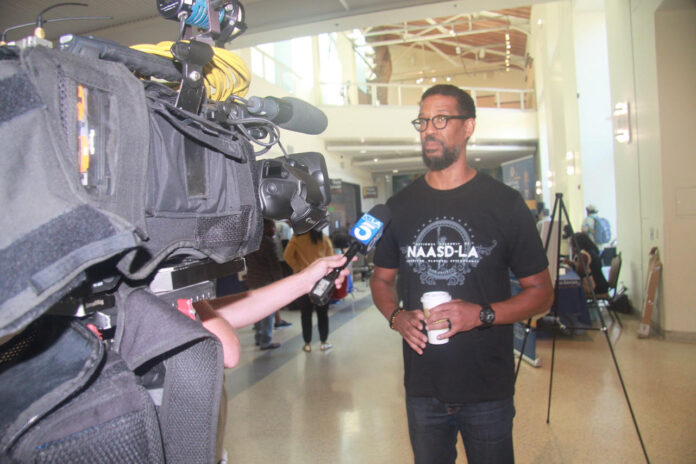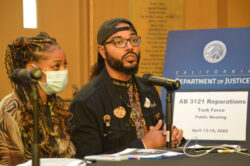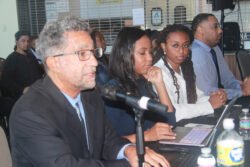
By Antonio Ray Harvey, California Black Media
The California Reparations Task Force to Study and Develop Reparation Proposals for African Americans will hold its last in-person meeting on June 29 in Sacramento. The meeting will take place in the First Floor Auditorium of the March Fong Eu Secretary of State Building, located at 1500 11th Street.
The task force will submit its final report to the California legislature. If approved, California could become the first state to provide reparations to the descendants of enslaved Black Americans.
Task force vice-chairperson Rev. Amos Brown said the state legislature must “do the right thing” before leaving San Francisco for a speaking engagement in Jackson, Miss., to recognize the 60th year since NAACP field secretary Medgar Evers was killed on June 12, 1963.
“It’s now time for some deliberate action,” said Brown, the pastor of Third Street Baptist Church in San Francisco. “If they don’t provide support, action, or forms of reparations in this nation, and in this state, they will be giving credence to bigotry, racism, and inhumanity towards Black folks.”
During the past 24 months, while the state reparations task force held public hearings and listened to expert testimony to uncover historical wrongdoings and discriminatory policies against descendants of enslaved Blacks in order to determine appropriate compensation, some cities in California started their own reparations efforts.
In June 2021, the city of Los Angeles established the Reparations Advisory Commission (RAC), a seven-member task force comprised of activists, academicians, attorneys, racial justice advocates, and more. It is supported by Los Angeles’ Civil + Human Rights and Equity Department’s Office of Racial Equity.
The RAC advises the city on the formation of a reparations pilot program for Californians who are descendants of enslaved Black Americans in the Los Angeles area, according to Khansa T. “Friday Jones” Jones-Muhammad, a member of the commission. The RAC provides recommendations for the format, function, and goals of the initiative, including strategies and opportunities to seek public or private funding.
In April, RAC hosted its first in-person forum at the California African American Museum.

“African Americans in Los Angeles are overrepresented in homelessness and underrepresented in generational wealth. It is the result of a system that has denied African Americans the ability to fully exercise their God-given liberties,” said RAC Chairperson Michael Lawson at the meeting.
Lawson is the CEO and President of the L.A. Urban League.
“The closure needed is a mutual recognition of the wrongs that have been meted upon the members of the victimized community. I am grateful to everyone who joined us as we take this step forward together,” he added.
In December 2020, the San Francisco Board of Supervisors passed an ordinance establishing the 15-member San Francisco African American Reparations Advisory Committee (AARAC).
Over the course of two years, AARAC developed a San Francisco Reparations Plan that addresses institutional and city-sanctioned wrongdoings against Black communities in San Francisco.
AARAC specifically focuses on improving different aspects of Black life, including education, housing, workforce development, economic opportunities, financial stability, small businesses, access to public transit, and food security. The committee is committed to reducing violence, addressing health disparities and preventing over-criminalization of African Americans.
In March, AARAC presented to the San Francisco Board of Supervisors over 100 recommendations, including a proposal to pay each qualifying Black city resident a one-time lump sum reparation payment of $5 million.
In an interview with San Francisco’s KRON 4 News on March 24, Eric McDonnell, the chairperson of AARAC, stated that the recommendations are an estimation of the atrocities experienced by Black Americans.
“Our task (AARAC) was to do the appraisal, and it’s the city’s task to determine, based upon recommendations, what they decide to adopt,” McDonnell said.
In 2020 after the murder of George Floyd, San Diego established the Department of Race and Equity (DRE) to address disparities experienced by individuals in the city. This initiative was led by San Diego City Councilmember Monica Montgomery-Steppe, who is a member of the state’s reparations task force.
Last year, the city of Sacramento began developing a municipal reparations initiative

committed to “truth telling and trust building” called the Sacramento Centered on Racial Equity (SCORE) plan.
SCORE is designed to interrupt patterns and processes rooted in dominant cultural patterns that perpetuate systemic racism and racial hierarchy within the city.
Betty Williams, the President of the Sacramento Branch of the NAACP, praised the work SCORE has started but she wants to further expand discussions on reparations for the Sacramento Black community.
“I want an outreach team to go out in the community to ask the critical question: ‘Do you want a (reparations) task force and what should it look like?’” Williams told California Black Media. “That’s the discussion I’ve had with Mayor (Darrell) Steinberg on how to put something like this together. It’s not just monetary. Education, housing, small business — all of those things should be part of the recommendations and of what reparations should look like for Black Sacramentans.”


